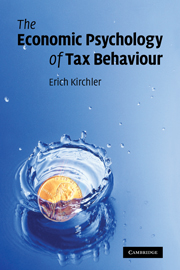Book contents
- Frontmatter
- Contents
- List of figures
- List of tables
- Foreword
- Preface
- 1 Introduction
- 2 Tax law, the shadow economy and tax non-compliance
- 3 Social representations of taxes
- 4 Tax compliance decisions
- 5 Self-employment and taxpaying
- 6 Interaction between tax authorities and taxpayers
- 7 Cautious conclusions
- References
- Index
2 - Tax law, the shadow economy and tax non-compliance
Published online by Cambridge University Press: 13 January 2010
- Frontmatter
- Contents
- List of figures
- List of tables
- Foreword
- Preface
- 1 Introduction
- 2 Tax law, the shadow economy and tax non-compliance
- 3 Social representations of taxes
- 4 Tax compliance decisions
- 5 Self-employment and taxpaying
- 6 Interaction between tax authorities and taxpayers
- 7 Cautious conclusions
- References
- Index
Summary
Complexity of tax law
Tax laws are not always clear. As Slemrod and colleagues put it, ‘although one can assert that legality is the dividing line between evasion and avoidance, in practice the line is blurry; sometimes the law itself is unclear, sometimes it is clear but not known to the taxpayer, sometimes the law is clear but the administration effectively ignores a particular transaction or activity’ (Slemrod, Blumenthal and Christian, 2001, p. 459).
The concern of legality grows in parallel with the increasing globalisation of business, the increasing complexity of business structures, the nature of financing and transactions and tax flight by establishing businesses off shore, tax havens and money laundering (Owens and Hamilton, 2004). Bartelsman and Beetsma (2003) and Yaniv (1990) present suggestive evidence of income shifting in response to differences in corporate tax rates for a large selection of OECD countries. Modern organised non-compliant businesses act within the law, exploiting the law's shortcomings and loopholes. In Cyprus alone, an estimated 37,000 companies have been established using the advantages of a tax haven, and the number is increasing steadily (Courakis, 2001). Businesses take advantage of loopholes in the law and find more sophisticated ways to reduce tax payments when new regulations and laws are established in response to aggressive avoidance. Businesses also respond symmetrically to tax changes, moving into the underground economy if taxes increase, and out when they decrease (Christopoulos, 2003).
- Type
- Chapter
- Information
- The Economic Psychology of Tax Behaviour , pp. 5 - 27Publisher: Cambridge University PressPrint publication year: 2007

